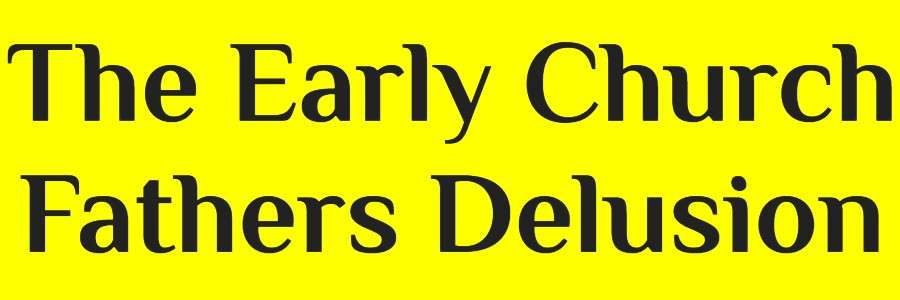
The Early Church Fathers Delusion
“Early Church Fathers” is actually a misleading term when applied to anyone besides the authentic Apostles of Christ in the first century AD. The so-called early church fathers were non-inspired writers. Only Christ’s Apostles, who were inspired in their writings that are in the Bible, are the true fathers of His true church.
Those who want to run to the so-called early church fathers don’t consider that they are often greatly removed from each other in terms of time and/or in terms of geography. They are even often very greatly removed from the Apostles of Christ in terms of time and/or in terms of geography.
And that is not even considering that there were heretics infiltrating and preying upon the churches the Apostles of Christ founded within the Apostles’ very own lifetimes.
How can you overlook books such as Galatians, 2 Peter, 1 John, and Jude which were written to counter heresy being spread among the first century Apostolic churches?
We see in Revelation chapters 2 and 3 that lukewarmness and heresy had crept into some of the very churches which were founded by Christ’s Apostles themselves. That was before Christ’s Apostles had even died off.
Many so-called “early church fathers”are among the grievous wolves which the Apostle Paul warned of in Acts chapter 20.
The Books of 2 John and 3 John also warn of deceivers operating among, or seeking to operate among, the first century Apostolic churches. In the instance of 3 John, the one contending with the Apostle John was Diotrephes. For all we know, Diotrephes was ordained as a Bishop by the Apostle John himself- yet later turned against John due to coming to love having the preeminence among the church. Regardless, there is no doubt Diotrephes was somehow leading a church which those whom the Apostle John regarded as authentic Christians were involved with.
We even see as John’s Gospel concludes that a tradition had picked up steam among the early Christians which was not rooted in truth.
John 21:20-23: “Then Peter, turning about, seeth the disciple whom Jesus loved following (this is obviously the Apostle John); which also leaned on his breast at supper, and said, Lord, which is he that betrayeth thee? Peter seeing him saith to Jesus, Lord, and what shall this man do? Jesus saith unto him, If I will that he tarry till I come, what is that to thee? follow thou me. Then went this saying abroad among the brethren, that that disciple should not die: yet Jesus said not unto him, He shall not die; but, If I will that he tarry till I come, what is that to thee?”
There were also obviously corrupted traditions among the Jews which sprang up, not only after the lifetimes of, but even contemporary with the men who served God faithfully in Israel and were used by God to write the Hebrew Scriptures. The Talmuds are full of such silly, ungodly traditions.
I hope you don’t trust the Talmuds; and I hope you don’t give certain portions of them more credibility because they are contemporary, or closer to contemporary, with the Old Testament Prophets. The (inauthentic) early church fathers of Christianity are not always right either. They are also often not agreed among themselves.
As with the Jews before Christ came, all writings of men which are not inspired, and the beliefs and practices which these writings are used to promote, need to be judged by the inspired Scriptures themselves. The Bible is the authority concerning what is true in relation to proper worship of God, and it is also the only valid referee concerning the claims which people make in relation to that.
Hezekiah knew, based on what God had definitely revealed about Himself through the inspired writings which existed in his time, that a popular religious tradition which had developed among the Jews was not of God. Hezekiah knew that the amount of religious leaders in Israel which had promoted this tradition, nor their actual or seeming proximity in time to faithful men of Scripture, did not validate their tradition.
Learn from the righteous Hezekiah.
2 Kings 18:1-6: “Now it came to pass in the third year of Hoshea son of Elah king of Israel, that Hezekiah the son of Ahaz king of Judah began to reign. Twenty and five years old was he when he began to reign; and he reigned twenty and nine years in Jerusalem. His mother’s name also was Abi, the daughter of Zachariah. And he did that which was right in the sight of the Lord, according to all that David his father did. He removed the high places, and broke the images, and cut down the groves, and broke in pieces the brazen serpent that Moses had made: for unto those days the children of Israel did burn incense to it: and he called it Nehushtan (my note- he called it a thing of brass- in defiance of Israel’s non-biblical tradition). He trusted in the Lord God of Israel; so that after him was none like him among all the kings of Judah, nor any that were before him. For he clave to the Lord, and departed not from following him, but kept his commandments, which the Lord commanded Moses.”
Deuteronomy 1232: “What thing soever I command you, observe to do it: thou shalt not add thereto, nor diminish from it.”
This was even spoken in the context of not trying to serve the true God in the way Pagans have been known to serve their gods. Pagan influence is prevalent among the so-called early church fathers.
Aaron’s email is: [email protected]
CLICK HERE TO GO TO OUR FRONT PAGE FOR ALL THE STUDIES
CLICK HERE TO GO TO OUR 3RD WORLD MISSION TO THE IMPOVERISHED

